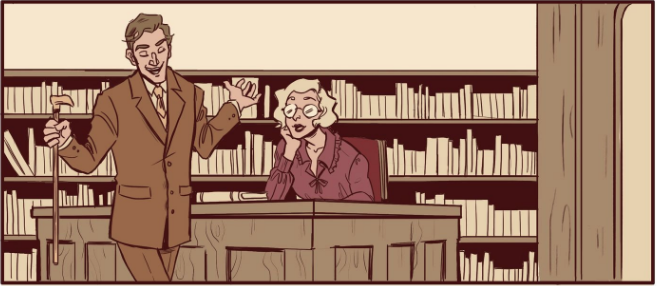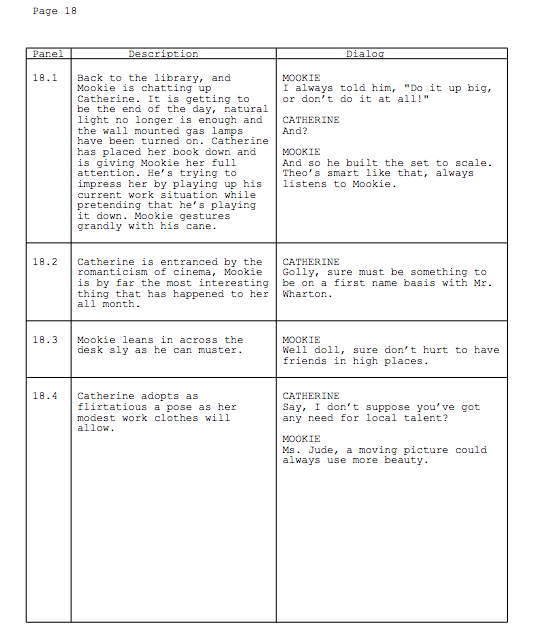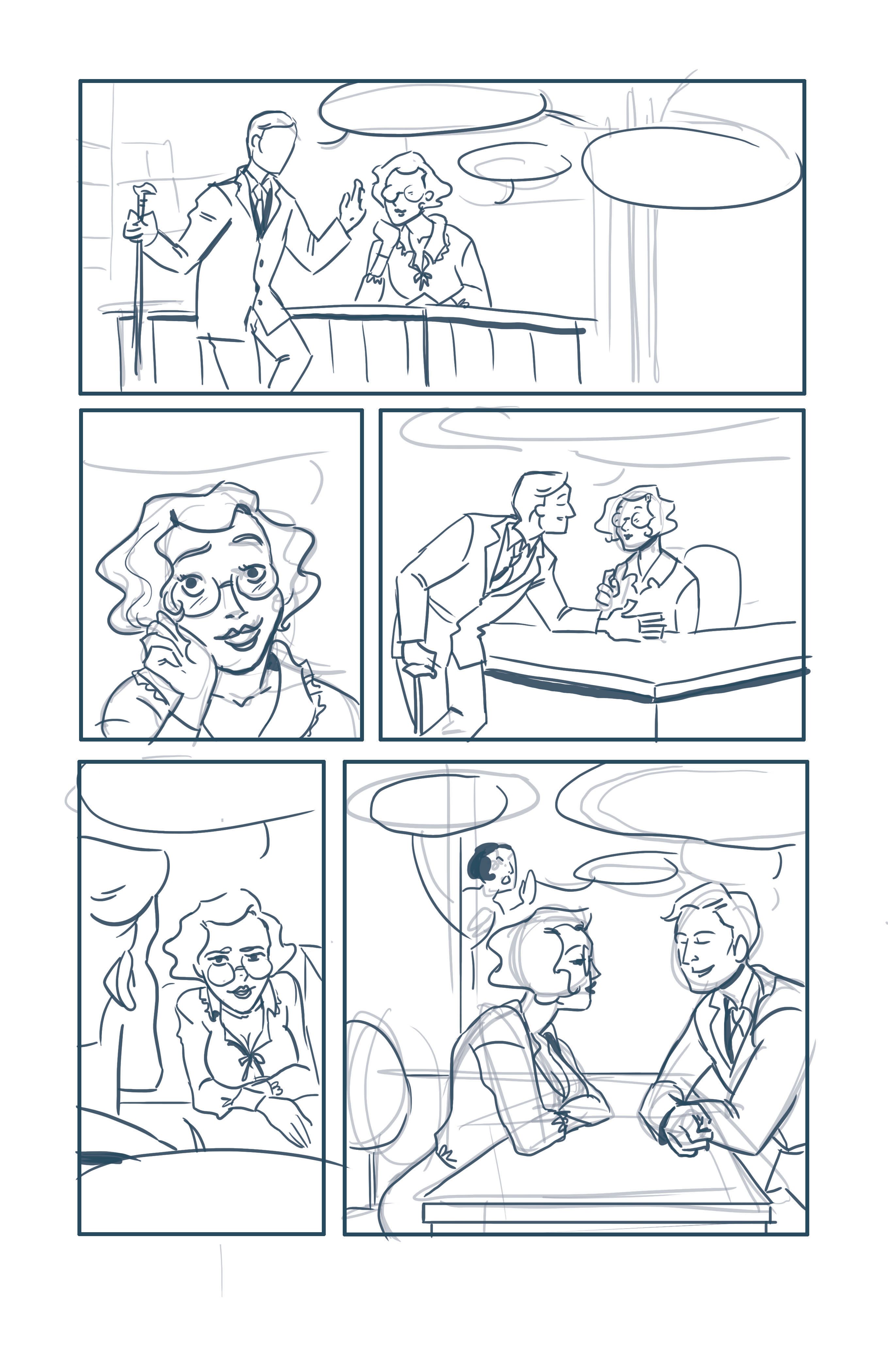What Goes Into A Comic Page

The reason I am even on Steemit right now is all thanks to @drwatson; way back in May/June, Michael and I started working on his comic series, Ithaqa, together. At one point we had been discussing different ways to draw attention to the comic and he had mentioned Steemit. In the ensuing months, as I was working on the comic he had been writing about the process of it all on Steemit. It was always incredibly fascinating for me to read about the behind-the-scenes of what went into making Ithaqa from the writer's perspective. I think it's just as interesting for me to learn about the series I've been illustrating for the past several months as it is for people just discovering Ithaqa.
I thought for this post I could share the process from the artist's point of view of what goes into making a page. The process of comic making, as you could probably guess, differs from situation to situation so this is specific to what Michael and I agreed would be the procedure for bringing Ithaqa to life.

The best case scenario for a cartoonist are scripts like this; Michael has illustrated exactly what he wants for each panel. o guesswork for me. Sometimes clients will just write descriptions for the page as a whole and then it is up to the artist to break the description down into panels. While it's nice to have the control over the panel layout for a page, getting a script like this usually eliminates situations where a client is displeased with the choices I have made.
Once I go through the script, I do quick thumbnail sketches of how I want to compose each panel. These drawings are always extremely rough, usually stick figures, and mostly just so I can go into the next phase with a basic idea of what I want the page to look like. I also show these to Michael so he can let me know if I'm on the right track.
Stage 1: The Roughs

I instantly knew I was going to have some fun with this page; Mookie (one of the main characters of Ithaqa) is such an amusing and expressive character to draw, especially in this particular interaction where he is trying to flirt with the librarian, Catherine. If anyone is familiar with the Legend of Korra, I get a lot of inspiration for Mookie's mannerisms from the character, Varrick.
As you can see the rough stage is pretty...rough. I'm going to let you in on a secret; it may take you 15 seconds to read a whole comic page but for artists, it takes a whole lot longer to create that page. As a professional, you don't want to put an incredible amount of time into the roughs because the earlier stages of the process are when clients are most likely to want the biggest changes. Or let's say I interpret something wrong, I don't want to have constructed a beautifully detailed scene just to be corrected and have to redraw it.
The rough stage is mostly to make sure I've interpreted the script correctly and that the composition reads well. I don't focus too much on anatomy and background details; I just get down the most important aspects. After this get's approved, I move on to the next stage.
Stage 2: Pencils

The penciling stage is definitely the part of the process I spend the most time on. I go back to the drawing and work through the anatomy, background details, and even changing panel composition around a little bit. It's not so evident in this particular example, but if you check out @drwatson's posts, you'll see some panels change a lot more than others. This is usually due to compositional, anatomical, or perspectival issues from my initial sketches.
The penciling stage is also the most important, in my opinion, as this is the stage that the page generally looks like what it's going to look like at the end of the process.
Stage 2: Inks

It was a pretty recent decision to go from drawing traditionally to digitally. This choice was also one of the smartest decisions I've made for my career; it makes the cartooning process so much easier. When I was working traditionally, the inking stage was just a frustrating as any other. I had one shot to get things right and had to deal with unwanted ink splots and shmearing my own artwork. Now, it's infinitely easier; if I make a mistake, my little buddy "command z" saves the day. I don't have to deal with my pen nib spitting ink in places it should not be and if I draw my pencils really well, I don't have to do that much work in the inking stage. This stage I devote time to adding line variation for added depths, adding more background details and textures.
Stage 2: Color

Lastly, we got the coloring stage. As you can see, I keep a coloring key around the edges of the page to make the process easier and so that I keep the coloring consistent. Michael and I decided to go with a limited color palette because, let's be honest, less is more. Obviously, taste is subjective and sometimes bright punchy comics with the entire rainbow in it can work in some instances. But I'll give you a little artist insight: limited palettes help to make a piece look more uniform. We went with these particular colors because Michael decided he wanted the colors to correspond with the seasons the story takes place in; right now, it's fall.
And now, ladies and gentlemen, you've got yourself a completed page!
Thank you for coming on this journey with me.
Once again, thank you for sticking until the end. Let me know if you have any questions or are curious about other aspects of the cartooning/illustrating process.
Ithaqa is a Lovecraftian horror comic that takes place in 1920s Ithaca. It follow a con-artist/filmmaker who accidentally stumbles across a dark plot as a moving picture he’s struggling to produce goes horribly wrong.
Sign up for updates on the Ithaqa website and give it a follow on your social media platform of choice:
FB: @IthaqaComic
Twitter: @IthaqaComic
Instagram: @IthaqaComic
If you'd like to keep up with more of my work you can check me out at the following:
Instagram: @la.fumettista
Tumblr: http://la-fumettista.tumblr.com/tagged/art
Twitter: @TheresaChiechi
Website: https://www.theresachiechi.com/
Until next time 👋
I’m curious what your software of choice has been in your move to digital? I was just raving about Clip Studio Paint in a post of my own a few minutes ago, so I’m in that “tool talk” kinda headspace!
Downvoting a post can decrease pending rewards and make it less visible. Common reasons:
Submit
I've been very commited to my relationship with Photoshop. I was raised by a graphic designer and Adobe programs have always been the way for me; so far Photoshop has done me well. I also use a wacom cintiq for a tablet which is the real hero of the story.
Downvoting a post can decrease pending rewards and make it less visible. Common reasons:
Submit
Good to know! Can’t go wrong with having Photoshop skills, especially when you’re freelancing professionally!
Sadly my Cintiq died about a month ago. If Steem makes us rich in a few years there’ll definitely be another in my future, but I’m actually growing much more accustomed to an iPad Pro in its absence.
Downvoting a post can decrease pending rewards and make it less visible. Common reasons:
Submit
Sorry to hear about your Cintiq, just read about it in your post. I actually used Manga Studio for a hot minute way back in high school, it's interesting to see that they rebranded it.
Luckily, I was able to use some scholarship money from my last year in college to put towards the Cintiq! It's been a blessing.
Downvoting a post can decrease pending rewards and make it less visible. Common reasons:
Submit
Love getting to hear about your thought process after spending so many months talking about mine haha
Downvoting a post can decrease pending rewards and make it less visible. Common reasons:
Submit
Congratulations @la-fumettista! You have completed some achievement on Steemit and have been rewarded with new badge(s) :
Click on any badge to view your own Board of Honor on SteemitBoard.
For more information about SteemitBoard, click here
If you no longer want to receive notifications, reply to this comment with the word
STOPDownvoting a post can decrease pending rewards and make it less visible. Common reasons:
Submit
Welcome to steemit!! :D
Yes moar comic artists!!!
thanks for sharing the tale of the process behind a comic page :D
Until next time indeed, following!
Downvoting a post can decrease pending rewards and make it less visible. Common reasons:
Submit
Even though I am newer than you here. Let me welcome you all the same.
Downvoting a post can decrease pending rewards and make it less visible. Common reasons:
Submit
Welcome to the community!

Downvoting a post can decrease pending rewards and make it less visible. Common reasons:
Submit
Nice one and welcome to steemit
Downvoting a post can decrease pending rewards and make it less visible. Common reasons:
Submit
Welcome to steemit!
Downvoting a post can decrease pending rewards and make it less visible. Common reasons:
Submit
Thanks for the interesting post, You're very talented. I would be interested to learn how you use Photoshop to do this. In the meantime, welcome to Steemit.
Downvoting a post can decrease pending rewards and make it less visible. Common reasons:
Submit
Hello there! I am too new here. This is just my 2nd day.
Downvoting a post can decrease pending rewards and make it less visible. Common reasons:
Submit
Great job. Great post. I really liked.
Downvoting a post can decrease pending rewards and make it less visible. Common reasons:
Submit
It's crazy how much things have changed from the days of hand-drawing on transparencies and "tweening" the gaps in animations by hand. I remember reading about all of these techniques growing up in Wizard magazine for comic lovers. The digital revolution affected every industry!
Downvoting a post can decrease pending rewards and make it less visible. Common reasons:
Submit
This was a grey progression post, I love seeing it. I am an artist as well and love finding more on Steemit. We have a great art community here, and good work too by the way.
Downvoting a post can decrease pending rewards and make it less visible. Common reasons:
Submit
Check this out too.
https://steemit.com/art/@orlendgreat/digital-art-of-totz
Downvoting a post can decrease pending rewards and make it less visible. Common reasons:
Submit
https://steemit.com/art/@orlendgreat/art-totz-studio
Downvoting a post can decrease pending rewards and make it less visible. Common reasons:
Submit
Can I request you to change the 'introduceyourself' tag to another like 'drawing'. Reason is I want to submit this to curie and the tag might pose a problem. Thank you very much.
Downvoting a post can decrease pending rewards and make it less visible. Common reasons:
Submit
I'm trying to edit the tags but Steemit keeps giving me an error message :(
Downvoting a post can decrease pending rewards and make it less visible. Common reasons:
Submit
Ow, that happens most of the time. Please reply to this if you manage to change it. Thanks.
Downvoting a post can decrease pending rewards and make it less visible. Common reasons:
Submit
Love seeing the process :)
Downvoting a post can decrease pending rewards and make it less visible. Common reasons:
Submit
Very nice ml and really wonderful art
Greetings to you
@walidsalah
Downvoting a post can decrease pending rewards and make it less visible. Common reasons:
Submit